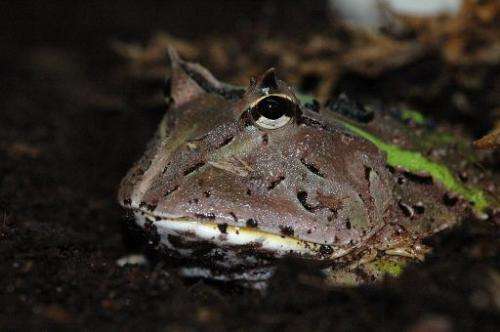Super-sticky frog leaves scientists tongue-tied

A South American frog has a tongue so sticky it can generate pulling forces three times the animal's own bodyweight, scientists reported on Thursday.
The amphibian with the lingual power is the horned frog—Ceratophrys in Latin—which is famous for grabbing outsized prey like snakes, lizards, crabs and rodents.
Curious to understand the trick, Thomas Kleinteich and Stanislav Gorb, biomechanics specialists at the Christian Albrecht University in Kiel, northern Germany, placed juicy titbits behind a pressure-sensitive glass panel.
Aiming for the food, the frog glommed its tongue onto the plate, enabling the team to measure the appendage's pulling power.
The big surprise was that the stickiness did not derive much from the mucus that coats the frog's tongue, the team said.
Instead, it is the surface texture of the tongue, and the qualities of its underlying tissues, that most likely provide the bulk of the adhesive strength.
"The experimental data shows that frog tongues can be best compared to pressure-sensitive adhesives that are of common technical use as adhesive tapes or labels," according to the study published in the journal Scientific Reports.
Journal information: Scientific Reports
© 2014 AFP

















